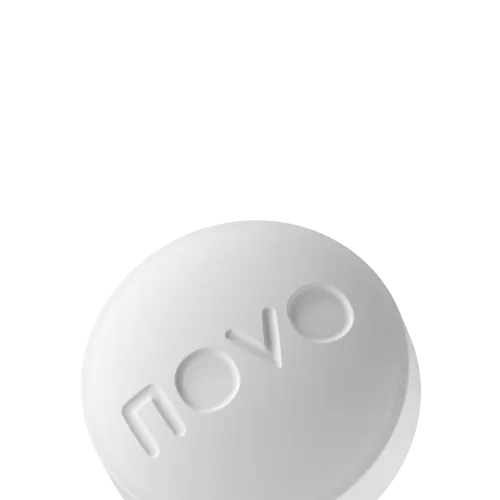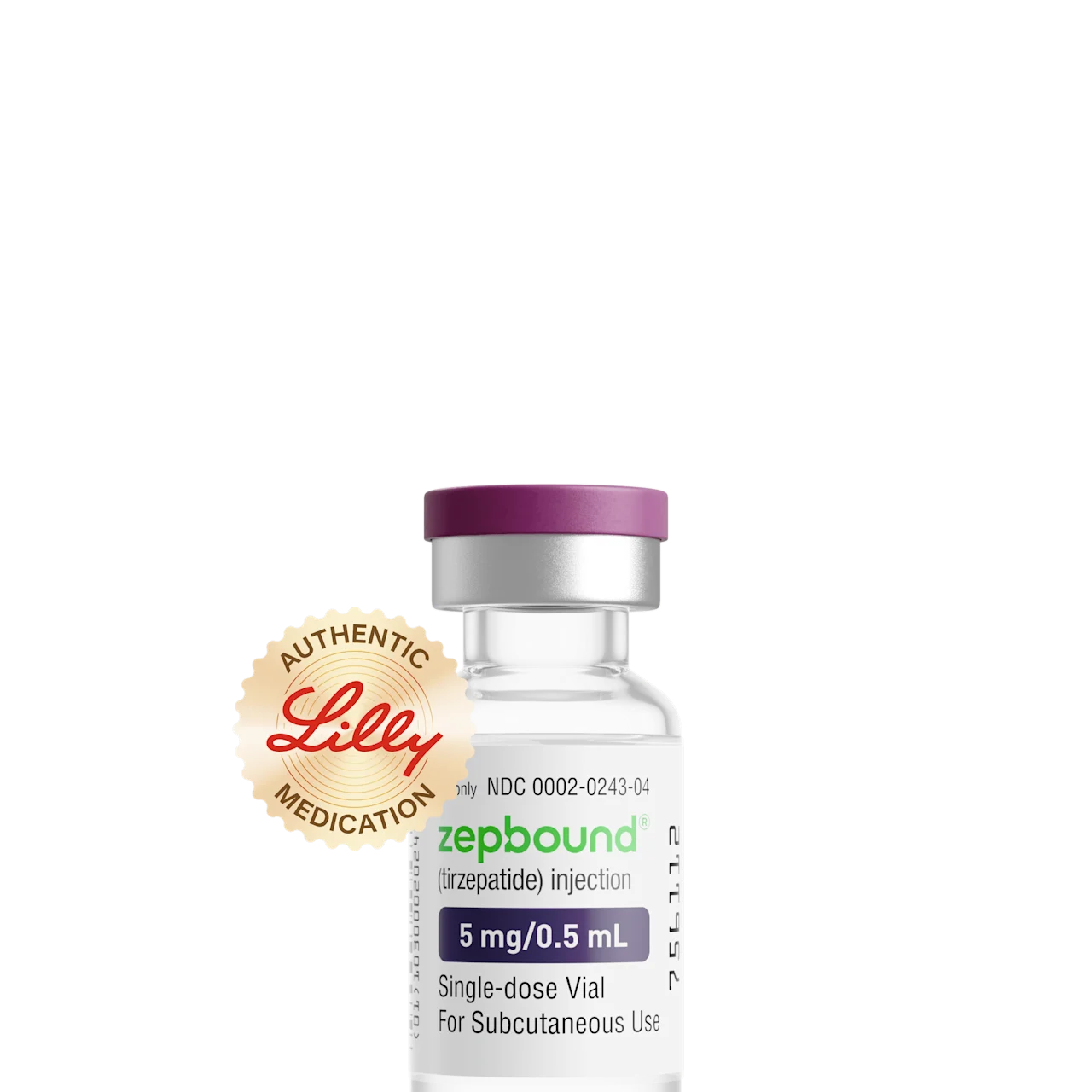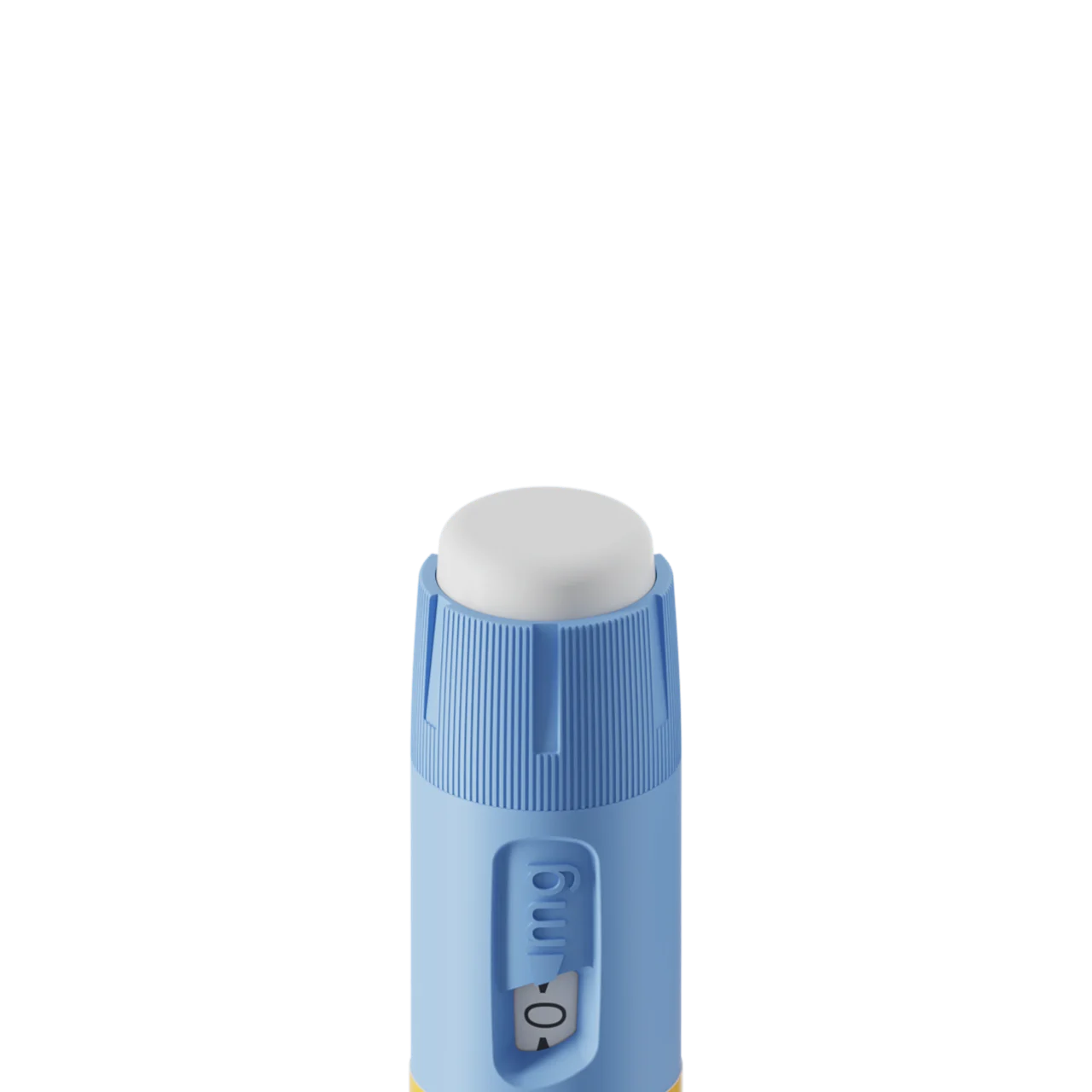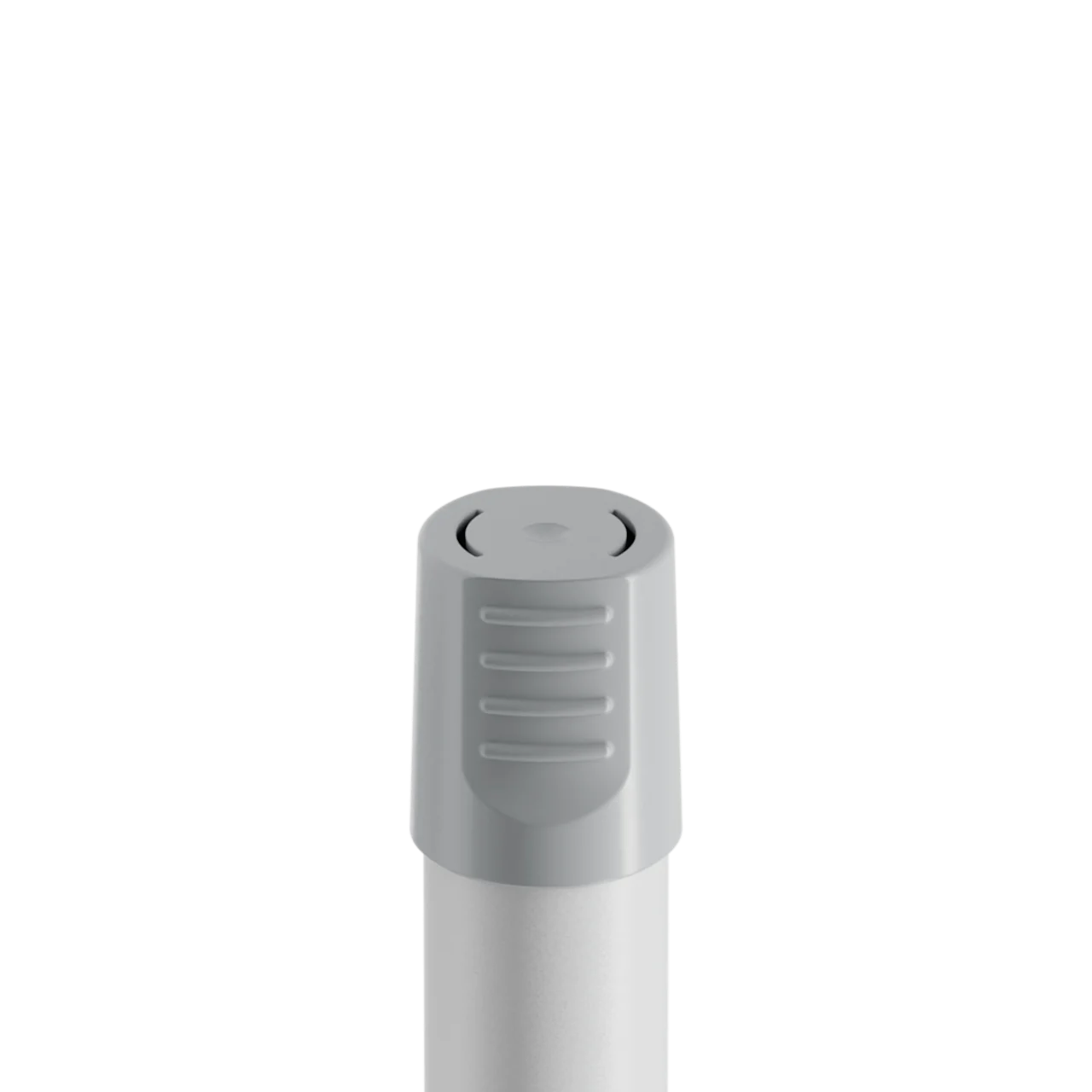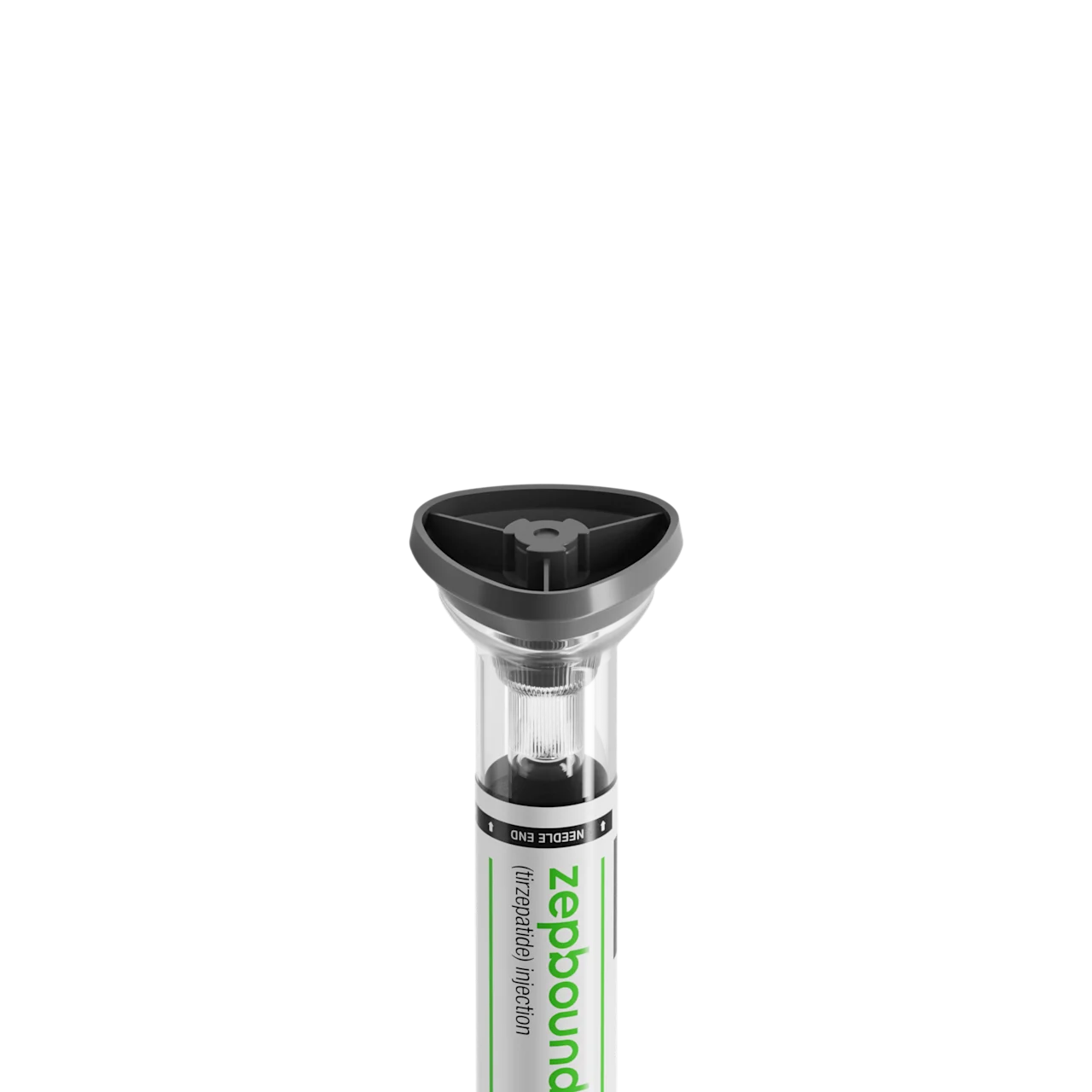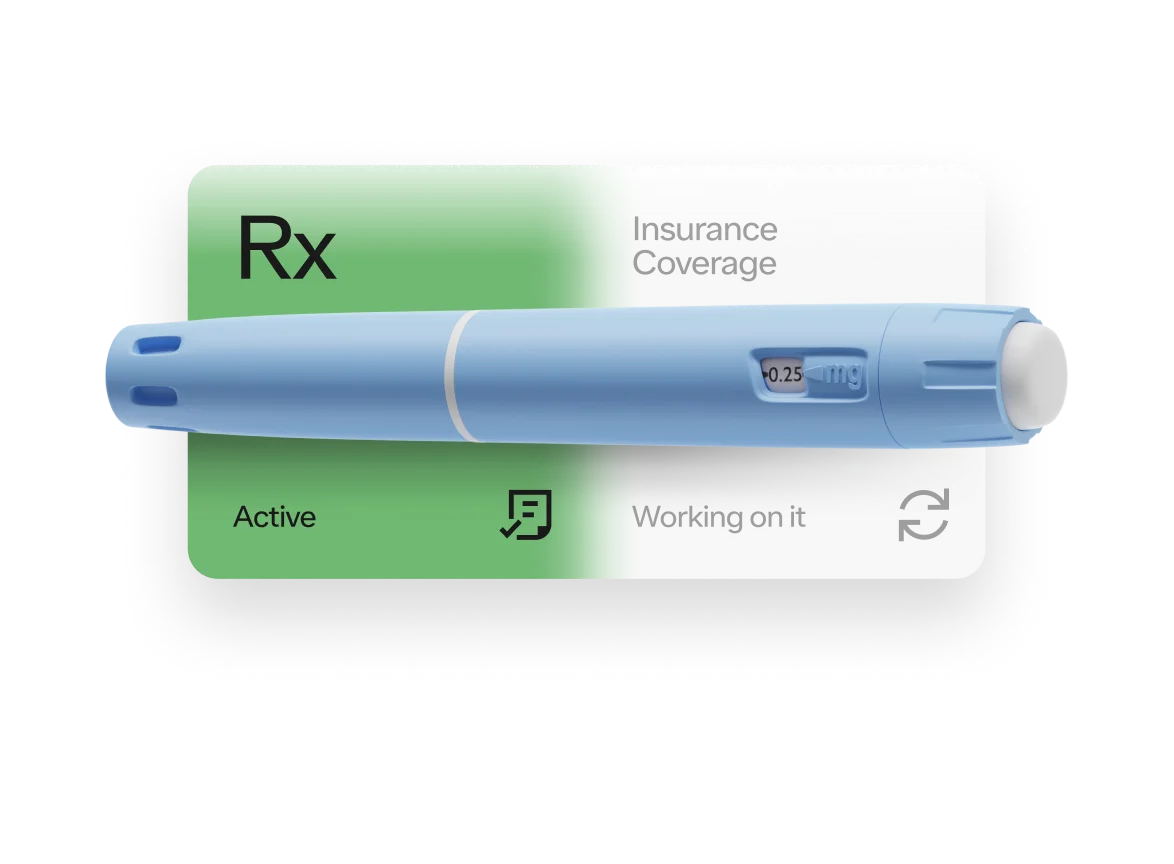Key takeaways
Berberine is a weight loss supplement that has gained popularity on social media as “nature’s Ozempic.”
While some research suggests that berberine may have modest impacts on weight, there aren’t enough high-quality studies to confirm whether it’s effective for weight loss.
Supplements like berberine may cause side effects, interact with some medications, or pose other health risks. Always talk to your provider or pharmacist before taking a new supplement to ensure it’s safe for you.
Here's what we'll cover
Here's what we'll cover
Here's what we'll cover
Key takeaways
Berberine is a weight loss supplement that has gained popularity on social media as “nature’s Ozempic.”
While some research suggests that berberine may have modest impacts on weight, there aren’t enough high-quality studies to confirm whether it’s effective for weight loss.
Supplements like berberine may cause side effects, interact with some medications, or pose other health risks. Always talk to your provider or pharmacist before taking a new supplement to ensure it’s safe for you.
If you've looked up weight loss trends on TikTok, you've probably seen influencers extolling the virtues of berberine weight loss supplements. Thanks to its relatively cheap cost and easy accessibility, this plant-based supplement has become a popular weight-loss aid. It's even been called "nature's Ozempic," a comparison to the FDA-approved prescription diabetes and weight-loss drug semaglutide.
With all the hype, can berberine actually help you lose weight? Maybe. Some evidence suggests that berberine can cause modest weight loss, but more high-quality research is needed to evaluate its effectiveness.
If you're curious about taking a berberine supplement, read on to learn more about how it works, what the research says about its effectiveness for weight loss, and what experts recommend you do to use berberine safely.
What is berberine?
Berberine is a natural chemical called an alkaloid (nicotine and caffeine are other examples of alkaloids). It's extracted from the roots, stems, leaves, and bark of several plant species, including barberry, Oregon grape, and goldenseal.
Traditional medicine practitioners valued berberine for its antibacterial, antiviral, anti-inflammatory, and antioxidant properties. This supplement has been used in Ayurvedic and Chinese folk medicine for thousands of years to treat infections, heal wounds, and relieve ailments ranging from hemorrhoids to diarrhea. It's even been an antidote for snake bites and scorpion stings.
Studies have also looked at berberine's potential health benefits and effectiveness in treating type 2 diabetes, high cholesterol, cardiovascular disease in men, and polycystic ovary syndrome (PCOS).
Today, berberine has gained popularity on social media for its supposed ability to promote weight loss, even though research hasn't confirmed this benefit.
So why is everyone talking about berberine for weight loss? Devika Umashanker, MD, system medical director of obesity medicine at the Hartford HealthCare Digestive Health Institute in Glastonbury, CT, says many of her patients want to know whether berberine is a natural alternative to weight-loss drugs like Ozempic.
"It's a question that I get asked frequently in the clinic, specifically by patients who are not really interested in regular medications that we use for weight loss or surgery, but would like to explore the pathway of supplements."
Berberine and weight loss: what the research says
Does berberine help with weight loss? It’s hard to say.
While researchers have conducted many animal studies looking at whether berberine lowers cholesterol, reduces inflammation, and helps with medical conditions like diabetes and fatty liver disease, there have been few studies investigating berberine for weight loss in humans.
What little human research that does exist has been promising, but inconclusive:
One review of 12 studies showed that berberine treatment reduced body weight, waist circumference, body mass index (BMI), and CRP (C-reactive protein)levels.
Another review looking at berberine for reducing cardiovascular disease risks found that it reduced weight compared to a placebo (inactive pill). The effect of berberine on weight loss was significant in people with overweight, those who took supplements containing more than 1 gram of berberine a day, and those who stayed on the supplements for more than eight weeks.
The big caveat is that many of the studies on berberine have been small, of poor quality, and short-term (one to four months). Most were conducted outside of the United States, in countries where research doesn't always follow the same rigorous standards.
"There has never been a large-scale or multicenter double-blinded randomized clinical control study designed to show the safety or efficacy of berberine," says Laura Young, MD, MHS, clinical assistant professor in the department of pediatrics in the Jacobs School of Medicine and Biomedical Sciences at the University of Buffalo in NY. This type of trial is the gold standard that the U.S. Food and Drug Administration (FDA) requires to approve medication.
Another reason it has been hard to confirm the effectiveness of berberine for weight loss is that existing studies have used different formulations and amounts. That means the ingredients and dose strengths they studied may not be the same as what you'll find in the supplements you can buy over the counter.
Most of the research wasn't done specifically to explore berberine for weight loss, but rather to see how the supplement helped with diabetes, non-alcoholic fatty liver disease, and PCOS, so we can't generalize the results to people who are solely looking to lose weight.
Lastly, the results of these studies are inconsistent. "Some [studies] showed a decrease in fat mass, weight, BMI, or waist circumference while others did not," Dr. Young says.
The takeaway: does berberine cause weight loss?
There’s some evidence that berberine may promote modest weight loss, but more research is needed. Currently, there are no high-quality studies evaluating berberine’s effectiveness for weight loss in humans.
How berberine may support weight loss
"Because of its properties, berberine could theoretically improve some of the mechanisms behind obesity, like the formation of fat cells, insulin resistance, and glucose [sugar] production in the liver," says Dr. Young.
While more research is needed to understand the potential health benefits of berberine, here’s a look at some of the ways it may impact weight loss:
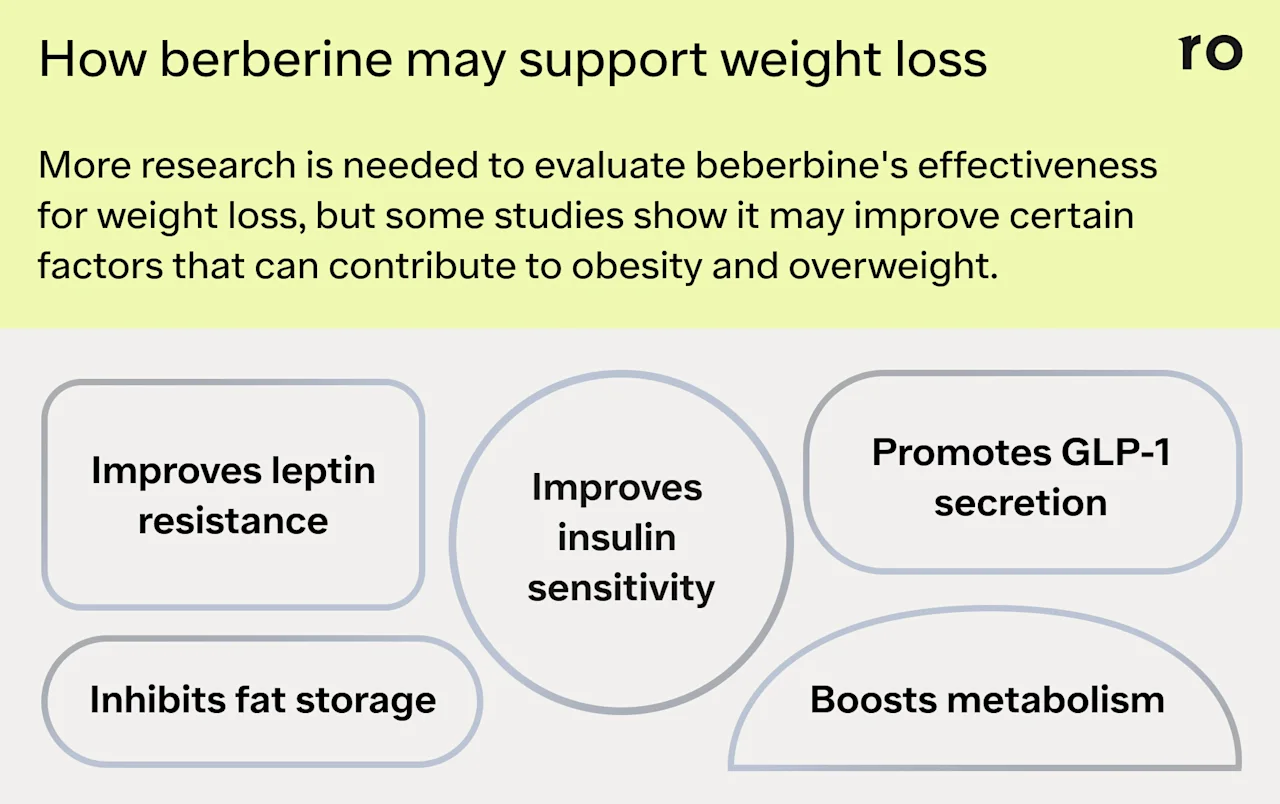
Improving insulin sensitivity
Berberine may promote weight loss via its effects on insulin and blood sugar levels. Insulin is the hormone that moves glucose (sugar) from your bloodstream into your cells, where they are converted into energy.
When you have insulin resistance, your cells don't respond well to this hormone, which can lead to more hunger, weight gain, and dysregulated blood glucose levels. Berberine might reduce insulin resistance by making cells more sensitive to the effects of insulin.
Promoting GLP-1 secretion
A study conducted in rats found that berberine improved levels of glucagon-like peptide-1 (GLP-1), a hormone that makes the pancreas release more insulin to help regulate blood sugar levels. GLP-1 is the same hormone that drugs like Ozempic and Wegovy mimic. In addition to blood sugar control, this hormone can also help reduce hunger cues in the brain and decrease appetite overall.
Improving leptin resistance
"Some studies have shown that berberine can decrease leptin resistance," says Dr. Umashanker.
Leptin is a hormone that signals your brain when you're full. When you have leptin resistance, your brain doesn't get the signal so you don't know when you've eaten enough. This can lead to an increased appetite and more hunger, and may also reduce energy levels and impact your body’s ability to burn calories.
Boosting metabolism
Berberine might also influence metabolism—the chemical reactions your body uses to change food into energy. It activates an enzyme called AMP-activated protein kinase (AMPK), which regulates metabolism and stimulates glycolysis, which enables your cells to convert glucose into energy.
Inhibiting fat storage
Another area of interest among scientists is how berberine might affect fat cells. In research conducted on cells in a lab, berberine prevented early fat cells from growing into mature fat cells. This finding suggests that berberine could potentially reduce the fat buildup that leads to weight gain, although this hasn't been proven in human studies.
Berberine dosage for weight loss
Berberine comes as a pill or powder. In studies, 1 to 1.5 grams of berberine a day reportedly helped with weight loss.
You can break it up into 500-milligram doses three times a day, and take it about a half hour before meals.
It’s not recommended to take berberine for more than six months because researchers don't have data on its effects beyond that length of time.
Berberine vs. other weight loss supplements and medications
Berberine is similar to other weight loss supplements in that there isn't much evidence to confirm it works.
Overall, the research on supplements needs to be improved. A review of more than 1,700 studies evaluating the effectiveness of dietary supplements for weight loss found no solid evidence that these products work. The researchers noted that many of the studies were too small, short, and poorly designed to draw any real conclusions about the supplements being investigated.
Though some people online have likened berberine to GLP-1 medications like Ozempic, experts say there’s no comparison.
"It's tremendously overblown," says Charlie Seltzer, MD, a board-certified obesity medicine doctor in Philadelphia. "I don't think that anything over the counter has a significant impact on weight," he says.
In terms of overall safety and effectiveness for weight loss, it’s hard to compare berberine to prescription weight loss medications. Currently, several oral and injectable medications are FDA-approved for weight loss:
Semaglutide (Wegovy)
Tirzepatide (Zepbound)
Liraglutide (Saxenda)
Phentermine (Adipex, Suprenza)
Phentermine-topiramate (Qsymia)
Naltrexone-bupropion (Contrave)
These medications went through an extensive FDA approval process and multiple clinical trials to prove they are safe and effective. Because these are prescription medications, they are also taken under the supervision of a knowledgeable healthcare provider, who can monitor patients for side effects and other health complications.
"The clinical data on the safety and efficacy of berberine is too limited to compare it to Ozempic or FDA-approved weight-loss medications," says Dr. Young. "And because [berberine] is sold as a dietary supplement, FDA approval is not required."
Any effects berberine might have on weight are far smaller than you'd get from weight loss medications. You might lose five pounds or less with berberine, compared to the 10% or more of body weight you can lose with drugs like semaglutide (the active ingredient in Ozempic).
"Ten percent is the sweet number where we see most of the weight-related comorbidities and risk factors decrease," says Dr. Umashanker.
But, she adds, losing five pounds may help jumpstart other lifestyle habits that can promote weight loss and reduce health risks.
Is berberine safe?
Just because a supplement is “natural” doesn't mean it's safe or effective.
The FDA doesn't regulate supplements in the same way as medications. That means you can't be certain how much active ingredient is in the bottle or what other unlisted substances it might contain. It also means that any health claims made by a vitamin or supplement manufacturer have not been reviewed or verified by the FDA.
Always talk to a trusted healthcare provider before you try any supplement to determine if it’s safe for you to take.
When researching supplements, look for brands that have a seal from third-party organizations such as:
These independent organizations certify products against established safety standards to make sure that the ingredients match the label, verify the supplement’s formulation and ensure there are no undisclosed ingredients, and test products for purity and potency.
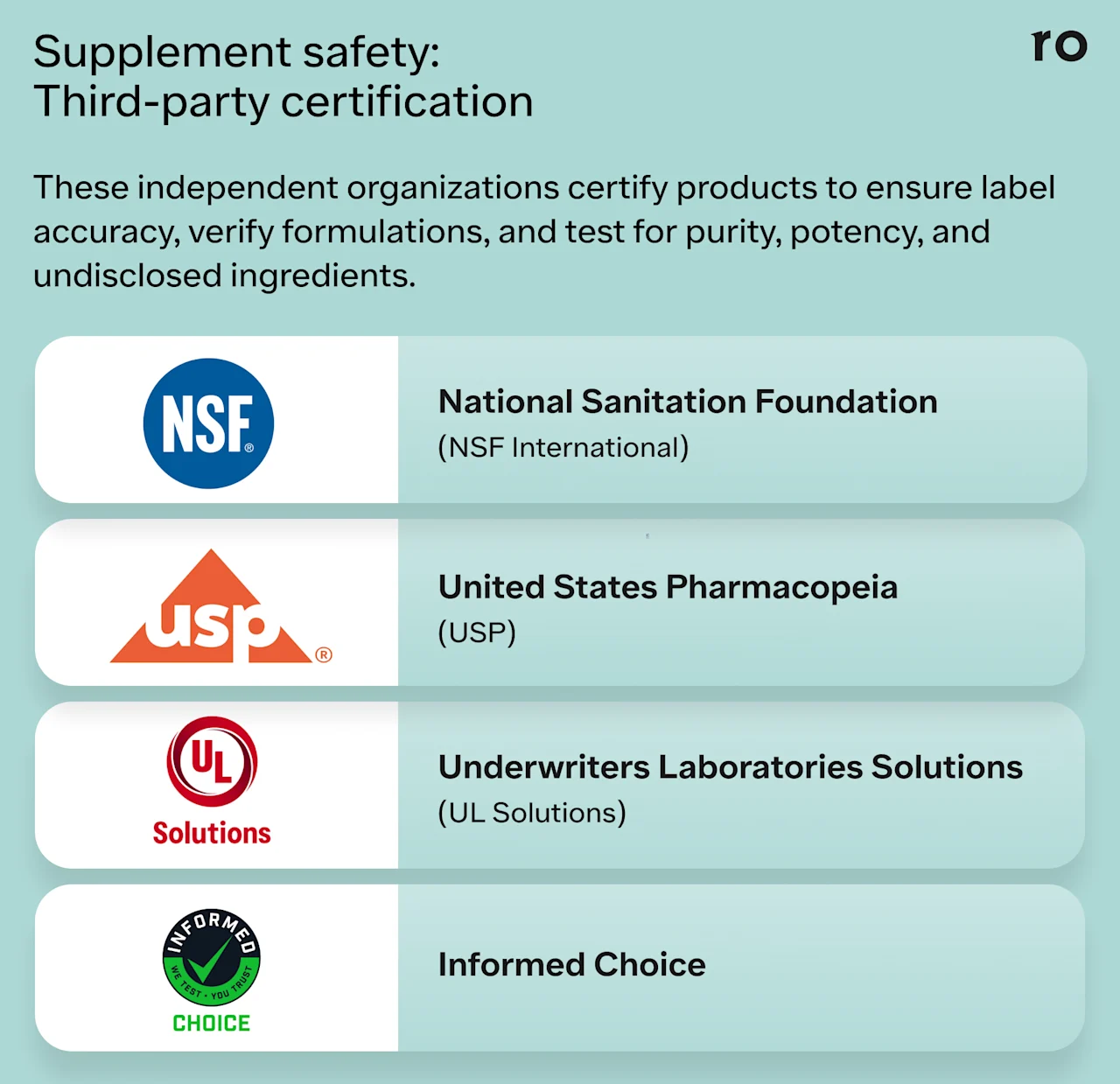
Potential side effects and risks of berberine
Berberine may be safe if you take it in the recommended amounts, but it's not without risks.
In some studies, people who took berberine supplements experienced gastrointestinal side effects like:
Nausea
Vomiting
Constipation
Diarrhea
Abdominal pain
Gas
Bloating
A bigger worry is that this supplement might interact with other medications you take and cause additional side effects or affect the way the drug works.
Potential drug interactions with berberine include:
Blood thinners like clopidogrel (Plavix)
Cyclosporine (Neoral, Sandimmune) and tacrolimus (Prograf), drugs used to prevent organ rejection
Dextromethorphan (Robitussin DM), a cough suppressant
Diabetes drugs such as metformin (Glucophage)
Losartan (Cozaar), a blood pressure drug
Sedatives like zolpidem (Ambien) and pentobarbital (Nembutal)
Because berberine acts on the liver, it could cause interactions with other medications processed by this organ.
Before you take berberine, talk to your doctor or pharmacist. Ask whether this supplement is safe for you, and if it's likely to interact with any medications you take.
Who should avoid berberine?
In addition to those taking the medications listed above, certain people should avoid berberine due to its risk for more serious health complications:
Berberine is not safe to use during pregnancy or while breastfeeding.
It's also not safe for babies. A Chinese study found that a supplement containing berberine increased the risk for kernicterus, a serious neurological disorder caused by a buildup of the waste product bilirubin, in jaundiced newborn babies. Kernicterus can lead to brain damage.
Berberine's impact on gut health
The human gut is home to a living city called the microbiome, populated by billions of bacteria, viruses, and other organisms. Some of these microorganisms live harmoniously with us and keep us healthy. Others can make us sick.
A balance of bad and good germs in the microbiome is essential to good health. Factors like diet, exercise, and medications can alter this balance, which may also contribute to weight gain and obesity.
Animal studies suggest that berberine promotes the growth of healthy bacteria in the gut. Theoretically, it could restore a healthy balance to the microbiome, which could, in turn, help people maintain a healthy weight. However, there is not currently enough evidence to support this theory.
Weight loss results with berberine: setting realistic expectations
In some studies, participants lost weight after taking berberine for at least eight weeks; however, the weight loss wasn't significant. Because the studies on berberine didn't go beyond a few months, it's also hard to know what happens once you stop taking this supplement.
If berberine acts like weight loss drugs, you're likely to regain any weight you lost unless you make radical changes to your diet and exercise routine, Dr. Umashanker says.
When you're evaluating berberine or any other supplement, social media influencers with dubious expertise aren't the best sources of advice. Your healthcare provider can tell you whether the supplement is safe for you, how much to take, and whether it could interact with any medicines you're taking.
Rx weight loss with Ro
Get access to prescription weight loss medication online
There is no “magic pill” for weight loss
When it comes to sustainable, safe weight loss, there is no quick fix (no matter what the internet hype says). Whether it’s a supplement or an FDA-approved medication, treatments for weight loss are designed to be used as part of a holistic approach that includes a balanced diet and regular exercise (150 minutes per week).
If you want to lose weight, discuss your goals with your healthcare provider. They can help you make a weight loss plan that’s tailored to your specific needs, and help set reasonable expectations and timelines for weight loss. Your doctor may determine that you are a good candidate for weight loss medication, or may suggest other alternatives, including lifestyle modifications, to support your overall health.
Bottom line
While touted on social media as “nature’s Ozempic,” available research shows that berberine may have only a modest impact on weight loss.
While some studies have shown other potential health benefits of berberine—such as blood sugar control, reduced cholesterol, and improved insulin resistance—more research is needed.
Just because something is labeled as “natural” doesn’t mean it’s safe for you. Always talk to your provider before taking a new supplement.
Berberine may cause mild GI side effects as well as potentially dangerous medication interactions.
If you want to try berberine, talk to your provider or pharmacist first—they can help you determine if it’s a safe option for you.
Frequently asked questions (FAQs)
How much weight can I lose with berberine?
The average amount of weight people lost with berberine in studies was around five pounds. Remember that various factors impact weight loss, and individual results may vary.
Is berberine an appetite suppressant?
No. Berberine may have effects on blood sugar control (which may impact hunger cues) but it doesn’t have the same impact on appetite and satiety as Ozempic or other GLP-1 medications.
When is the best time to take berberine for weight loss?
In studies, people took berberine three times a day, about a half hour before meals.
How quickly does berberine work?
It can take eight weeks or more to see any weight loss with berberine; however, most studies show that weight loss is modest at best.
DISCLAIMER
If you have any medical questions or concerns, please talk to your healthcare provider. The articles on Health Guide are underpinned by peer-reviewed research and information drawn from medical societies and governmental agencies. However, they are not a substitute for professional medical advice, diagnosis, or treatment.
Ozempic Important Safety Information: Read more about serious warnings and safety info.
Wegovy Important Safety Information: Read more about serious warnings and safety info.
Zepbound Important Safety Information: Read more about serious warnings and safety info.
Saxenda Important Safety Information: Read more about serious warnings and safety info.
References
Aoun, A., Darwish, F., & Hamod, N. (2020). The influence of the gut microbiome on obesity in adults and the role of probiotics, prebiotics, and synbiotics for weight loss. Preventive Nutrition and Food Science, 25(2), 113-123. doi: 10.3746/pnf.2020.25.2.113. Retrieved from https://pmc.ncbi.nlm.nih.gov/articles/PMC7333005/
Asbaghi, O., Ghanbari, N., Shekari, M., et al. (2020). The effect of berberine supplementation on obesity parameters, inflammation and liver function enzymes: A systematic review and meta-analysis of randomized controlled trials. Clinical Nutrition ESPEN, 38, P43-P49. doi: 10.1016/j.clnesp.2020.04.010. Retrieved from https://clinicalnutritionespen.com/article/S2405-4577(20)30080-2/abstract
Batsis, J. A., Apolzan, J. W., Bagley, P. J., et al. (2022). A Systematic Review of Dietary Supplements and Alternative Therapies for Weight Loss. Obesity, 29(7), 1102-1113. doi: 10.1002/oby.23110. Retrieved from https://onlinelibrary.wiley.com/doi/10.1002/oby.23110
Chan, E. (1993). Displacement of bilirubin from albumin by berberine. Biology of the Neonate, 63(4), 201-208. doi: 10.1159/000243932. Retrieved from https://karger.com/neo/article-abstract/63/4/201/368139/Displacement-of-Bilirubin-from-Albumin-by
Hu, Y., Ehli, E. A., Kittelsrud, J., et al. (2012). Lipid-lowering effect of berberine in human subjects and rats. Phytomedicine, 19(10), 861-867. doi: 10.1016/j.phymed.2012.05.009. Retrieved from https://www.sciencedirect.com/science/article/abs/pii/S0944711312001870?via%3Dihub
Ionescu, O. M., Frincu, F., Mehedintu, A., et al. (2023). Berberine—A promising therapeutic approach to polycystic ovary syndrome in infertile/pregnant women. Life, 13(1), 125. doi: 10.3390/life13010125. Retrieved from https://www.mdpi.com/2075-1729/13/1/125
Koppen, L. M., Whiaker, A., Rosene, A., et al. (2017). Efficacy of berberine alone and in combination for the treatment of hyperlipidemia: A systematic review. Journal of Evidence-Based Integrative Medicine, 22(4), 956-968.doi: 10.1177/2156587216687695. Retrieved from https://journals.sagepub.com/doi/10.1177/2156587216687695
Li, W., Hua, B., Saud, S. M., et al. (2016). Berberine regulates AMP-activated protein kinase signaling pathways and inhibits colon tumorigenesis in mice. Molecular Carcinogenesis, 54(10), 1096-1109. doi: 10.1002/mc.22179. Retrieved from https://onlinelibrary.wiley.com/doi/10.1002/mc.22179
Liu, D., Zhang, Y., Liu, Y., et al. (2018). Berberine modulates gut microbiota and reduces insulin resistance via the TLR4 signaling pathway. Experimental and Clinical Endocrinology & Diabetes, 126(8), 513-520. doi: 10.1055/s-0043-125066. Retrieved from https://pubmed.ncbi.nlm.nih.gov/29365334/
Lu, S. S., Yu, Y. L., Zhu, H. J., et al. (2009). Berberine promotes glucagon-like peptide-1 (7-36) amide secretion in streptozocin-induced diabetic rats. The Journal of Endocrinology, 200(2), 159-165. https://doi.org/10.1677/JOE-08-0419. Retrieved from https://joe.bioscientifica.com/view/journals/joe/200/2/159.xml
Neag, M. A., Mocan, A., Echeverría, J., et al. (2018). Berberine: Botanical occurrence, traditional uses, extraction methods, and relevance in cardiovascular, metabolic, hepatic, and renal disorders. Frontiers in Pharmacology, 9(557), 1-30. doi: 10.3389/fphar.2018.00557. Retrieved from https://www.frontiersin.org/journals/pharmacology/articles/10.3389/fphar.2018.00557/full
Och, A., Och, M., Nowak, R., et al. (2022). Berberine, a herbal metabolite in the metabolic syndrome: The risk factors, course, and consequences of the disease. Molecules, 27(4), 1351. doi: 10.3390/molecules27041351. Retrieved from https://www.mdpi.com/1420-3049/27/4/1351
U.S. Food and Drug Administration (FDA). (2023). Facts about Dietary Supplements. Retrieved from https://www.fda.gov/news-events/rumor-control/facts-about-dietary-supplements
Wang, Y., Yi, X., Ghanam, K., et al. (2014). Berberine decreases cholesterol levels in rats through multiple mechanisms, including inhibition of cholesterol absorption. Metabolism, 63(9), p1167-1177. doi: 0.1016/j.metabol.2014.05.013. Retrieved from https://linkinghub.elsevier.com/retrieve/pii/S0026049514001620
Wilding, J. P. H., Batterham, R. L., Calanna, S., et al. (2021). Once-Weekly Semaglutide in Adults with Overweight or Obesity. The New England Journal of Medicine, 384(11), 989–1002. doi: 10.1056/NEJMoa2032183. Retrieved from https://pubmed.ncbi.nlm.nih.gov/33567185/
Yang, J., Yin, J., Gao, H., et al. (2012). Berberine improves insulin sensitivity by inhibiting fat store and adjusting adipokines profile in human preadipocytes and metabolic syndrome patients. Evidence-Based Complementary and Alternative Medicine, 2012(1), 1-9. doi: 10.1155/2012/363845. Retrieved from https://onlinelibrary.wiley.com/doi/10.1155/2012/363845
Yin, J., Gao, Z., Liu, D., et al. (2007). Berberine improves glucose metabolism through induction of glycolysis. American Journal of Physiology-Endocrinology and Metabolism, 294(1), E1-E201. doi: 10.1152/ajpendo.00211.2007. Retrieved from https://journals.physiology.org/doi/full/10.1152/ajpendo.00211.2007
Yin, J., Ye, J., & Jia, W. (2012). Effects and mechanisms of berberine in diabetes treatment. Acta Pharmaceutica Sinica B, 2(4), 327-334. doi: 10.1016/j.apsb.2012.06.003. Retrieved from https://www.sciencedirect.com/science/article/pii/S2211383512000871?via%3Dihub
Zamani, M., Zarei, M., Nikbaf-Shandiz, M., et al. (2022). The effects of berberine supplementation on cardiovascular risk factors in adults: A systematic review and dose-response meta-analysis. Frontiers in Nutrition, 9, 01-39. doi: 10.3389/fnut.2022.1013055. Retrieved from https://www.frontiersin.org/journals/nutrition/articles/10.3389/fnut.2022.1013055/full
Zhao, J. V., Yeung, W. F., Chan, Y. H., et al. (2021). Effect of berberine on cardiovascular disease risk factors: A mechanistic randomized controlled trial. Nutrients, 13(8), 2550. doi: 10.3390/nu13082550. Retrieved from https://www.mdpi.com/2072-6643/13/8/2550




